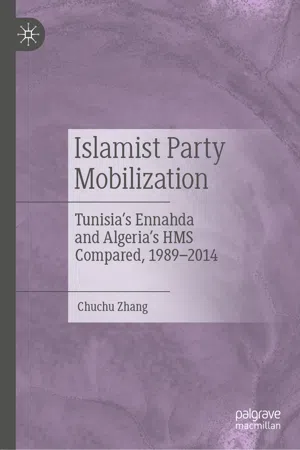Almost three decades after the start of the Third Wave of Democratization (Huntington 1993), North Africa experienced tremendous difficulties in getting rid of authoritarian systems. Interestingly, each time when the region experienced a real weakening in authoritarianism, whether in the form of top-down liberalization reform or bottom-up protest waves, Islamist parties rose concomitantly and seized strong positions to capitalize on political change. Such scenes took place in the 1980s and early 1990s as Tunisia’s Ennahda, Algeria’s Islamic Salvation Front (Front Islamique du Salut, FIS), and Yemen’s Islamic Action Front (IAF) each cut a striking figure in elections. After a short collapse in the late 1990s when most Islamist groups in the Muslim world witnessed what Schwedler (1998, 27) called “modest changes” or even sharp declines in vote share, the rise of the “Islamist vote” seemed to reappear in 2011 as the Arab Spring brought to power Islamist parties at the ballot box in several North African countries. North Africa thus appeared to be a region in constant flux struggling with democratization, with little opportunity to experience over time the role of Islamists in democratization. This research adopts the definition of democracy proposed by the American and Italian political scientists (Diamond and Morlino 2004, 21): a form of government which protects citizens’ human rights, rule of law, free and fair elections, and citizens’ participation in political and civic life.
To unveil the role of the “Islamist vote,” I explore what Islamist parties really mean to the electorate and opposition parties accustomed to living in authoritarianism where lack of democracy is highly politicized (Lust-Okar 2003, 1). Observation of party politics and elections in North Africa cannot be based upon the common assumption that they “are integrally associated with democratic political systems” (Tachau 1994, xiv). Though superficially sharing institutions called “elections,” the structure of rules in electoral authoritarianism differs dramatically from that in a democratic system where elections are freer because they are protected by the rule of law and pluralistic media. Yet, in the former systems where elections are controlled and manipulated, citizens can still reject the authoritarian regime whose misgovernment brings socio-economic and psychological grievances, and opposition parties including Islamist parties can cater to such demands by providing Islamic debate, political locations of Islamic activism, and an alternative discourse to that of the regime. This leads me to examine how citizens’ demands and Islamist parties’ interaction with each other in electoral authoritarianism change in different political settings.
The Questions Posed
The central question is: How do Islamist parties mobilize debates, discourses, and environments in electoral authoritarian systems? In unraveling the answer, two sets of questions arise regarding the two sides involved in elections, the mobilized , meaning the citizens, and the mobilizer, referring to the Islamist parties. The first is: What are the concerns of citizens in the particular political contexts of North Africa? Regarding the mobilizer , here lies the second question: How do Islamist parties mobilize people to vote for them in elections? As discussed above, Islamist parties often become the forces most likely to offer a substitute for an autocratic regime at the polls in North Africa. The study further examines the mobilization strategies adopted by Islamist parties and analyzes their effectiveness and costs.
I address these questions through an in-depth comparative study of two parties, Tunisia’s Ennahda and Algeria’s Hamas/Harakat Mujtami’a al-Silm (HMS). The central question of my research can thus be broken down into more specific sub-questions: How did Ennahda and the HMS survive and develop in responding to the constraints of electoral authoritarianism? How did Ennahda and the HMS adjust their programs and incorporate popular views into their agendas? Why and how did Ennahda and the HMS demonstrate different mobilization capacities in different time periods? Why and how did Ennahda become the biggest winner in the 2011 election after being excluded from the political scene for two decades, while the HMS, which had always been included in formal political institutions, lose much of its base around the same time? To analyze these questions, the research involves theoretical studies by interrelating three theoretical schools—electoral authoritarianism theory, protest voting theory, and political process theory. It addresses these theories in a North African setting and expands on them to create new areas of theoretical application. Also, it expands the authoritarian accommodation and framing aspects by adding new, more nuanced interim categories that evolve inductively from the research and contribute to the sophistication of analysis, as explained in Chapter 2.
The issue being addressed here is whether the successful mobilization of an Islamist party is dependent on what it supplies to voters and what role it plays in society. The research is of value because it offers analysis of the importance of Islamist parties in North Africa specifically and critical theoretical insights about confessional party politics in general. Three main points emerge:
First, the study sheds light on Ennahda’s and the HMS’ historical evolution, which forms the basis for comprehending their legacies of success and failure, as well as their current organizational dynamics, ideological orientations, and political agendas.
Second, understanding the voting and mobilization in electoral authoritarian systems helps elucidate important theoretical concerns regarding elections and party politics. Until we explore the questions of whether citizens’ voting decisions are outcomes of emotional sensibilities or meticulous calculation, and what exactly Islamist parties supply to get citizens to support them, we remain unable to fully understand the elections and the religious marketplace in electoral authoritarian contexts, and the democratization predicament in the region.
Third, the research provides insights for policy-making regarding political reform in North Africa. By exploring “How do Islamist parties mobilize citizens?”, and “Do Islamist parties always demonstrate strong mobilization capacity and why?”, the study offers nuanced analysis around the institution of the Islamist vote and its mythical power. It argues that Islamist parties do not always demonstrate stronger mobilization capacity than more secular parties, because although Islamist parties often demonstrate efficiency in supplying Islamic debates, they ...
